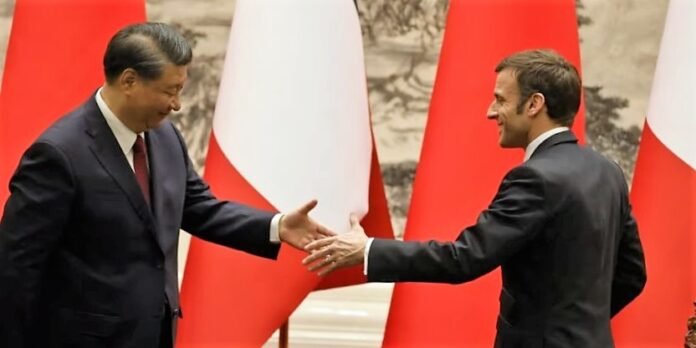Xi Jinping Stands Firm on Russia’s Invasion of Ukraine
French President Emmanuel Macron’s recent visit to China failed to change the country’s position on Russia’s war with Ukraine. Despite Macron’s attempts at fraternal appeal, Chinese leader Xi Jinping showed no signs of altering his stance on the conflict. This was revealed during talks between the two leaders on the second day of Macron’s state visit to Beijing. According to reports, Xi expressed dissatisfaction with Macron’s efforts and did not answer most of the journalists’ questions.
During the talks, Xi reiterated China’s long-standing position on Russia’s full-scale invasion of Ukraine. He stated that “all sides” had “reasonable concerns about security” and gave no indication that he would use his influence to help end the conflict. Xi instead expressed his willingness to join France in calling on the international community to remain rational and calm. Macron responded by stressing the need to resume peaceful negotiations as soon as possible.
Macron’s Hopes and Expectations
Macron’s visit to China was primarily aimed at persuading the country to use its influence on Russia to end the conflict. The French president also hoped that Xi would express his position on the Kremlin’s threat to place nuclear weapons in Belarus. However, the leaders of the countries spent an hour and a half in bilateral talks, which a representative of the Elysee Palace described as “frank and constructive.” They then signed several agreements and deals on cultural cooperation.
Protocol Error and Divergent Positions
During the signing ceremony, Chinese officials bowed low to the leader of Beijing before signing the contracts. This was reported by the media. However, the protocol error noticed by Jinping’s entourage caused some tension during the ceremony.
During the subsequent press conference, Macron spoke for a longer time than Xi had anticipated. Jinping had already seen Macron’s answers in advance, so he appeared impatient and irritated. Journalists described the press conference as “a communist-style press conference” in which most of the questions were left unanswered.
France’s Position vs. China’s Position
Macron tried to call on Xi Jinping to openly condemn Russia’s aggression towards Ukraine. He argued that talking about peace and stability means talking about the war that Russia is waging against Ukraine. Macron also condemned Russia’s plans to place nuclear weapons in Belarus, stating that such a threat “does not correspond” to international nuclear agreements.
On the other hand, Xi Jinping chose rhetoric calling for the need for warring parties to “protect victims, including women and children.” This was especially in the context of news about the International Criminal Court issuing an arrest warrant for the Kremlin leader for his involvement in the illegal transfer of Ukrainian children to Russia. However, Xi did not mention Russia in his speech, indicating that China is not willing to change its stance on the ongoing conflict.
Conclusion
Despite Macron’s efforts, China’s position on Russia’s war with Ukraine remains unchanged. Xi Jinping’s rhetoric during the talks with Macron indicates that China is not willing to use its influence to help end the conflict. This puts France in a difficult position, as it seeks to resolve the conflict through peaceful negotiations. The protocol error during the signing ceremony and Xi’s impatience during the press conference also reflect the divergent positions of the two countries on this issue.











